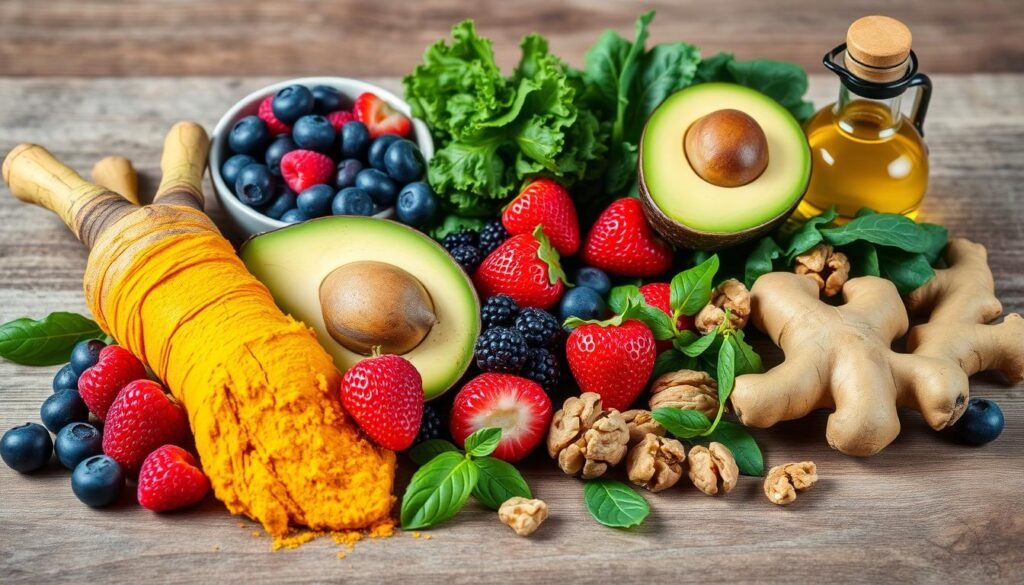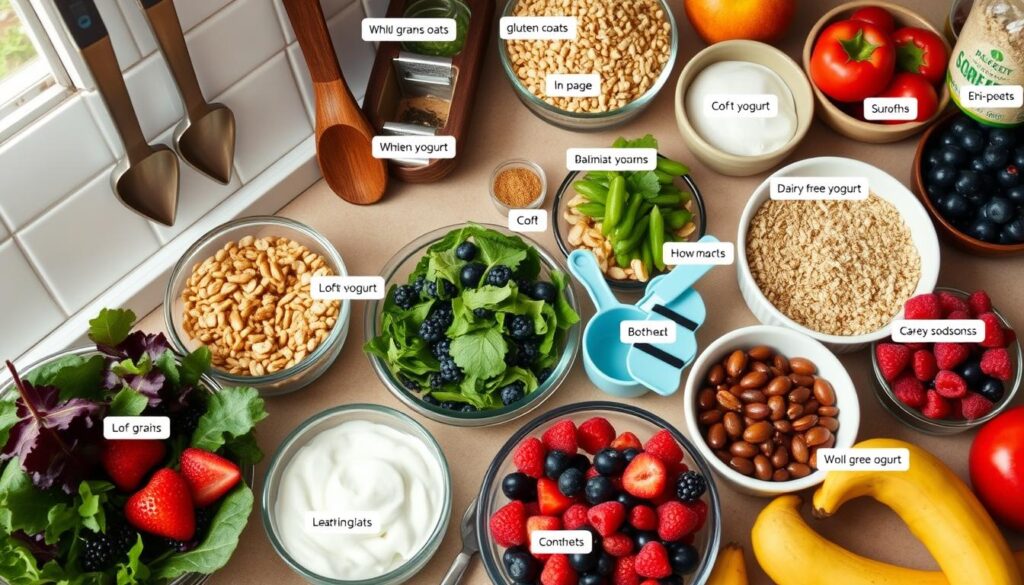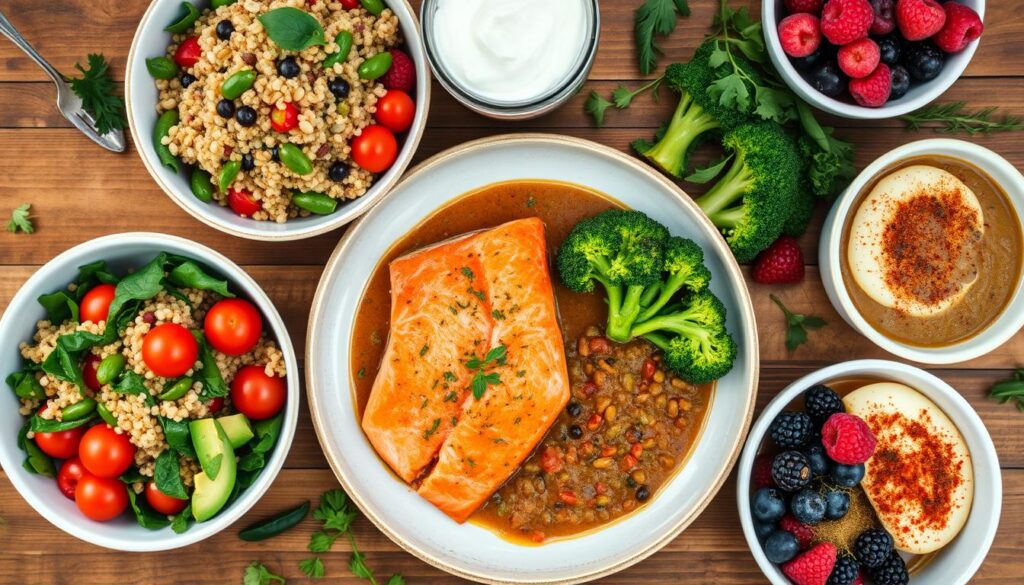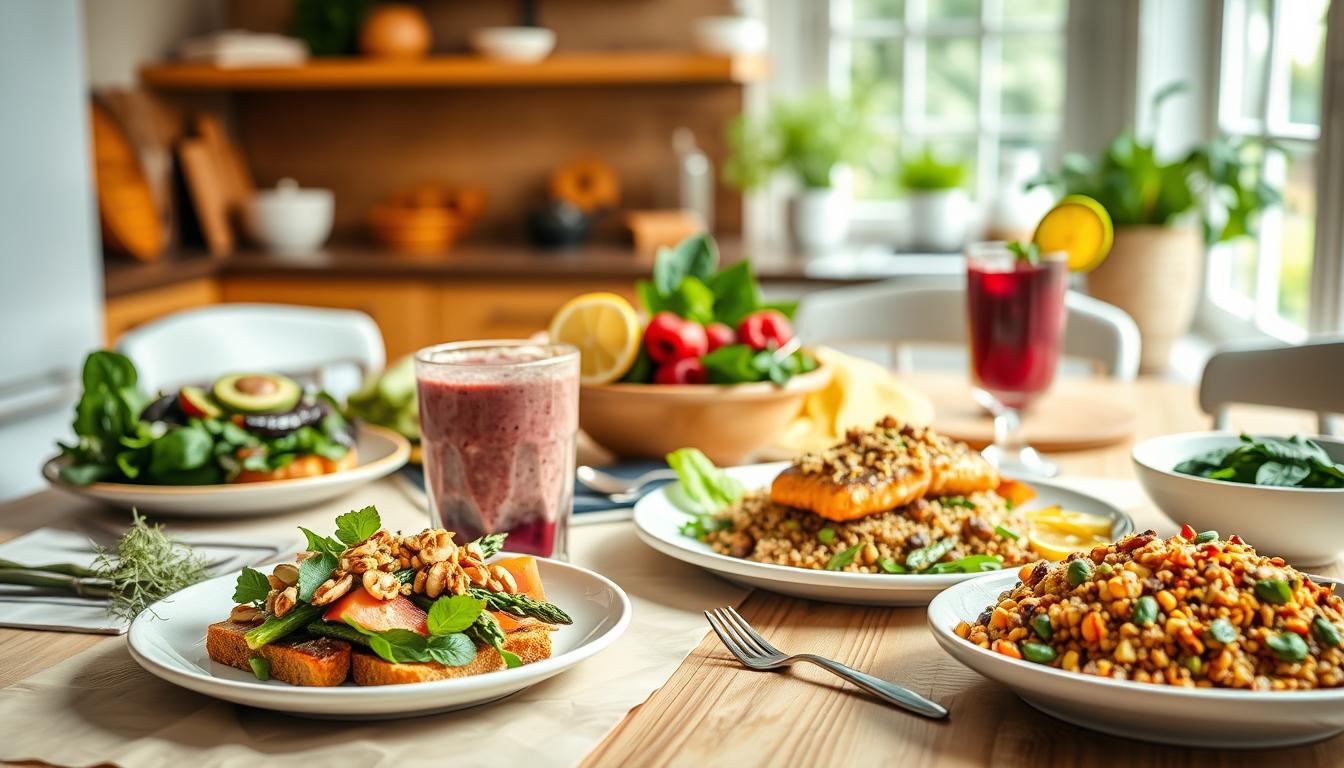Powerful Specific Diets aren’t just a passing trend; they’re a powerful gateway to transforming your health, mental clarity, and heart wellness. Understanding the impact of Powerful Specific Diets helps us realize how what we eat can shape our mental clarity and cardiovascular fitness in profound ways.
Let’s explore how Powerful Specific Diets are transforming heart-healthy recipes and brain-boosting meals, revolutionizing nutrition and wellness.
Imagine savoring Powerful Specific Diet dishes that not only tantalize your taste buds but also nourish your brain and protect your heart. These aren’t just pipe dreams – they’re real, nutrient-dense dishes backed by science. The American Heart Association has long championed the power of food in maintaining cardiovascular health.
Now, emerging research is showing how certain foods can enhance cognitive function too.
From leafy greens that reduce heart disease risk to omega-3-rich fish that boost cognitive function, the ingredients in Powerful Specific Diets are powerful allies in your journey toward better health.
Did you know that adding just one or two servings of whole grains to your daily diet could reduce your risk of coronary heart disease by up to 20%? Or that regular avocado consumption is linked to a 16% lower risk of cardiovascular disease?
Get ready to explore four recipes that bring together the best of heart-healthy and brain-boosting ingredients. These dishes are not just meals; they are integral parts of Powerful Specific Diets that act as a delicious investment in your long-term health and vitality.Let’s embark on this culinary journey to nourish both body and mind!
Key Takeaways
- Heart-healthy recipes can significantly reduce cardiovascular disease risk
- Brain-boosting meals support cognitive function and mental clarity
- Nutrient-dense dishes combine ingredients beneficial for both heart and brain
- Whole grains, leafy greens, and fatty fish are powerhouse ingredients
- Regular consumption of heart-healthy foods can lower blood pressure and cholesterol
- Balanced nutrition plays a crucial role in overall mental and cardiovascular fitness
Understanding the Connection Between Diet, Mental Health, and Heart Wellness
Powerful Specific Diets play a key role in our health. Whole foods are at the core of maintaining well-being, directly affecting our mind and heart. Let’s dive deeper into this powerful connection.
The Science Behind Food’s Impact on Brain Function
Our brain needs nutrients from food to work right. Research shows that up to 95% of serotonin, which makes us feel good, is made in our gut. This shows a strong link between what we eat and our mental health.
“Let food be thy medicine and medicine be thy food.” – Hippocrates
Eating foods full of probiotics can help with anxiety and depression. Adding probiotic-rich foods to our diet can be a great natural remedy.
How Nutrition Affects Cardiovascular Health
The Mediterranean Diet (MD) is a prime example of a Powerful Specific Diet that supports heart health. It’s low in unhealthy fats and packed with beneficial antioxidants and fibers, making it excellent for cardiovascular wellness.
The PREDIMED study showed MD’s long-term benefits for heart health. Another study, PREDIMED-Plus, found that a diet and exercise combo improved metabolic syndrome in many people.
Key Nutrients for Mental and Heart Health
Some nutrients are crucial for our brain and heart. Here are some recipes that are good for both:
| Recipe | Calories per Serving |
|---|---|
| Avocado salsa with homemade tortilla wedges | 108 |
| Overnight oats | 228 |
| Salmon patties | 177 |
By eating these nutrient-rich foods, we can help our mental and heart health. This shows the power of whole foods in keeping us healthy.
Essential Ingredients for Brain-Boosting and Heart-Healthy Meals
Creating meals that align with Powerful Specific Diets is easy and simple. Focus on anti-inflammatory foods and powerful ingredients to enhance your overall health. Focus on anti-inflammatory foods to make dishes that boost your health. Let’s look at some key ingredients to make your cooking better and your body healthier.
Leafy greens like kale, spinach, and collards are key ingredients in Powerful Specific Diets that provide nutrients essential for both brain health and cardiovascular wellness. They have vitamin K, lutein, folate, and beta carotene. Spinach, for example, has lutein, which helps clear brain toxins and fights age-related mental decline.
Lentils are great for your meals too. They’re full of polyphenols that fight inflammation and keep your brain healthy. Eggs are also a good choice for protein. They have vitamins B6, B12, folate, and choline, which are key for brain function and memory.
Healthy fats are important too. Almonds have vitamin E, magnesium, and protein, which protect brain cells and improve thinking. Walnuts, with their DHA (an Omega-3 fatty acid), boost brain performance. For your heart, add fatty fish like salmon, tuna, or herring to your meals.
- Blueberries: Improve motor skills and learning capacity
- Pumpkins: Good source of B and C vitamins, supporting brain health
- Dark chocolate (high cocoa content): Rich in flavonoids that protect cognitive function
By using these ingredients in your cooking, you’ll make tasty and healthy meals. A healthy diet is all about variety. So, mix these foods to keep your meals interesting and good for you.
4 Powerful Specific Diet Recipes to Boost Your Mental and Cardiovascular Health
Eating well with Powerful Specific Diets is essential for maintaining a healthy heart and mind. Let’s explore four delicious, nutrient-dense recipes designed to enhance both brain and cardiovascular health.These dishes support both mental clarity and cardiovascular wellness. They are easy to make and full of flavor, proving healthy eating can be enjoyable and beneficial.
Spinach and Feta Morning Power Muffins
Start your day right with these nutrient-dense muffins. Spinach provides folate and magnesium, which help lower blood pressure. The feta adds calcium for heart health. These muffins are perfect for busy mornings and keep you full until lunch.
Mediterranean-Style Chicken Shawarma Bowl
This colorful bowl is a heart-healthy feast. Lean chicken offers protein without excess saturated fat. The bowl includes a variety of veggies, meeting the American Heart Association’s recommendation of eight or more servings of fruits and vegetables daily. A drizzle of olive oil adds heart-protective monounsaturated fats.
Heart-Healthy Moroccan Lentil Stew
Warm up with this aromatic stew. Lentils are rich in fiber, which can help lower cholesterol levels. The stew includes sweet potatoes, providing a lower glycemic index alternative to white potatoes. Spices like cumin and coriander not only add flavor but also contain antioxidants that support heart health.
Brain-Boosting Cod with Fennel and Vegetables
This dish delivers omega-3 fatty acids crucial for brain and heart health. The American Heart Association recommends eating fatty fish twice a week, and this recipe makes it easy and delicious. Fennel and colorful vegetables add fiber and antioxidants, supporting overall cardiovascular wellness.
These 4 powerful specific diet recipes to boost your mental and cardiovascular health are not just nutritious – they’re delicious too. By incorporating these meals into your diet, you’re taking a tasty step towards better health for both your brain and heart.
Nutritional Benefits of Each Recipe Component
These Powerful Specific Diet dishes are full of brain-boosting and heart-healthy nutrients. Let’s break down the ingredients that make these recipes perfect for boosting cognitive function and fighting inflammation.
Anti-inflammatory Properties
“The turmeric-ginger tonic is one of the best Powerful Specific Diet ingredients, known for its powerful anti-inflammatory properties. It has only 103 calories but is full of compounds that reduce inflammation. The miso soup with soba noodles is also anti-inflammatory, with just 232 calories per serving.
Omega-3 Rich Ingredients
Our salmon tacos are loaded with omega-3 fatty acids. Each serving has 43g of protein and healthy fats, which are good for your brain and heart. The blueberry kefir smoothie also adds omega-3s, with 15g of protein per serving.
Antioxidant Content
The kale salad is full of antioxidants. It has 390 calories and is packed with vitamins and minerals that protect your cells. The blueberry smoothie also has lots of antioxidants, with 355 calories of nutrients.

| Recipe | Calories | Protein (g) | Total Fat (g) | Sugar (g) | Sodium (mg) |
|---|---|---|---|---|---|
| Salmon Tacos | 637 | 43 | 28 | 10 | 743 |
| Blueberry Kefir Smoothie | 355 | 15 | 13 | 32.6 | 133 |
| Miso Soup with Soba | 232 | 15 | 4 | 7.6 | 718 |
| Kale Salad | 390 | 4 | 30 | 21.3 | 195 |
| Turmeric-Ginger Tonic | 103 | 2 | 3 | 9.8 | 366 |
Meal Preparation and Planning Strategies
Starting with meal prep and heart-healthy recipes can change how you eat. Studies prove that cooking at home is better for your health. It lowers the risk of chronic diseases like type 2 diabetes. Let’s look at some ways to make healthy eating easy.
Batch cooking is an excellent strategy for preparing meals that fit within a Powerful Specific Diet, ensuring you’re always stocked with healthy, heart-boosting, and brain-nourishing dishes. Spend a few hours on weekends cooking big batches of key ingredients. This saves time and keeps you stocked with healthy food.
Another smart move is to portion meals in individual containers. It’s great for tracking nutrients or controlling portions. This fits well with heart-healthy recipes, helping you reach your health goals.
When planning meals, choose whole foods. Add lots of vegetables, fruits, legumes, and whole grains. These foods are full of fiber, vitamins, and minerals good for your heart and brain.
| Meal Prep Strategy | Benefits | Time Investment |
|---|---|---|
| Batch Cooking | Time-saving, ensures healthy options available | 2-3 hours weekly |
| Pre-portioning | Portion control, convenient for busy days | 30 minutes weekly |
| Weekly Meal Planning | Reduces food waste, saves money | 15-30 minutes weekly |
A good meal plan doesn’t have to be complicated. Begin with planning just a few meals a week. As you get better, you can try more heart-healthy recipes and prep methods.
Customization Options for Dietary Restrictions
These Powerful Specific Diet recipes can easily be customized to fit various dietary restrictions while still offering the benefits of heart health and brain function. We want everyone to have access to healthy meals that boost mental and heart health. Let’s look at some ways to customize these recipes for you.
Gluten-Free Modifications
If you’re gluten-sensitive, replace wheat with gluten-free options. Use almond or coconut flour in the Spinach and Feta Morning Power Muffins. For the Mediterranean-Style Chicken Shawarma Bowl, try cauliflower rice or quinoa instead of couscous.
Vegetarian and Vegan Alternatives
Plant-based fans can enjoy these recipes too. Swap chicken with tofu or tempeh in the Shawarma Bowl. For the Brain-Boosting Cod dish, try grilled portobello mushrooms or eggplant. These changes keep the protein while fitting vegetarian or vegan diets.

Low-Sodium Adaptations
To cut down on sodium, use fresh herbs and spices for flavor. In the Heart-Healthy Moroccan Lentil Stew, add more cumin and coriander. For the Cod recipe, use a salt-free seasoning blend and lemon zest for flavor without sodium.
These customizations let you enjoy healthy, heart-healthy meals that fit your dietary needs. Always talk to a healthcare professional or registered dietitian before making big changes to your diet, especially if you have health concerns.
Storage and Meal Prepping Guidelines
Learning to meal prep is crucial for following heart-healthy recipes. A 2021 study showed that home cooking leads to more fruits and veggies. Let’s dive into some smart tips for storing and prepping your meals.
Start by getting airtight containers. The USDA notes that most cooked foods stay fresh for 3-4 days in the fridge. For longer storage, many dishes can be frozen for 2-6 months. This is great for those with busy lives.
When prepping meals, mix things up. Offer different options for breakfast, lunch, and dinner. Try overnight oats or veggie egg bites for breakfast. For lunch, consider high-protein chicken salads or colorful bento boxes. Dinners could include turkey meatballs or teriyaki stir-fry.
| Meal | Prep Ideas | Storage Time (Fridge) |
|---|---|---|
| Breakfast | Overnight oats, Egg bites | 3-4 days |
| Lunch | Chicken salad, Bento boxes | 3-4 days |
| Dinner | Turkey meatballs, Stir-fry | 3-4 days |
Meal prep is more than just saving time. It’s a key to a balanced diet. Aim for meals full of whole grains, leafy greens, and lean proteins. This fits well with heart-healthy diets like the MIND diet.
By planning ahead, you’re setting yourself up for success. With these tips, you’ll find it easier to stick to healthy, heart-healthy recipes all week.
Tips for Maximizing Nutritional Value
Boosting the nutritional value of your meals is key to creating nutrient-dense dishes and embracing whole food nutrition. Let’s explore some practical tips to get the most out of your cooking.
Proper Cooking Methods
Cooking techniques can significantly impact the nutritional content of your food. Steaming vegetables preserves more nutrients compared to boiling. For meats, opt for grilling or baking instead of frying. These methods help retain vitamins and minerals while reducing unhealthy fat intake.
Ingredient Selection Guidelines
Choosing high-quality ingredients is crucial for nutrient-dense dishes. Pick fresh, colorful produce and lean proteins. Incorporate whole grains like quinoa or brown rice into your meals. Greek yogurt, rich in protein and lower in lactose, makes an excellent addition to many recipes.
Seasonal Considerations
Seasonal produce often packs more flavor and nutrients. It’s typically fresher and hasn’t traveled long distances, preserving its nutritional value. Creating a seasonal meal plan can add variety to your diet and boost your nutrient intake.

| Cooking Method | Benefit | Example |
|---|---|---|
| Steaming | Preserves nutrients | Broccoli, carrots |
| Grilling | Reduces fat content | Chicken, fish |
| Raw consumption | Retains enzymes | Salads, fruits |
Remember, small changes can make a big difference. Swapping refined grains for whole grains or choosing water over sugary drinks can significantly increase the nutrient density of your diet. By focusing on whole food nutrition and mindful cooking methods, you’ll be on your way to creating delicious, nutrient-dense dishes that nourish both body and mind.
Incorporating These Recipes into a Balanced Lifestyle
Living a balanced life is crucial for good health. Our heart-healthy and brain-boosting recipes are a big part of it. Let’s see how to use these meals to improve your overall health.
Controlling your portions is important for heart health. Try to eat half your plate with veggies, a quarter with lean protein, and a quarter with whole grains. This mix helps you get all the nutrients you need without eating too much.
Also, add regular exercise to your routine. The American Heart Association says you should do at least 150 minutes of moderate exercise each week. This can be walking, swimming, or cycling. Exercise helps your diet work better, improving your mind and heart.
Don’t overlook stress management and sleep. Try meditation or deep breathing every day. Make sure to sleep 7-9 hours each night to help your body and mind recover.
| Lifestyle Component | Recommendation | Benefit |
|---|---|---|
| Diet | Balanced meals with portion control | Supports heart health and cognitive function |
| Exercise | 150 minutes/week of moderate activity | Improves cardiovascular fitness |
| Stress Management | Daily meditation or deep breathing | Reduces stress, supports mental health |
| Sleep | 7-9 hours nightly | Enhances recovery and cognitive function |
By adding these recipes to a complete lifestyle, you’re making big strides in health. Remember, being consistent is key. Start small, create habits, and enjoy the path to a healthier life!
Conclusion
We’ve looked at 4 powerful diet recipes that boost mental and heart health. Each recipe is full of nutrients that help your brain and heart. From the omega-3 rich Lemon Salmon with Basil to the fiber-filled Southwest Stuffed Sweet Potatoes, these dishes are delicious and nourishing.
The Mediterranean-inspired Goat Cheese and Ham Omelet shows how tasty food can be good for you. It’s packed with heart-healthy ingredients. These recipes are a tasty way to care for your body and mind.
Adding these recipes to your meals does more than just please your taste buds. It’s a step towards better mental and heart health. A diet full of antioxidants, probiotics, and heart-healthy nutrients is key to well-being. The Hearty Bean Burrito Bowl and Veggie and Quinoa Collard Wraps are great plant-based options.
As you try these recipes, remember to balance and vary your diet. Experiment with ingredients and enjoy cooking and eating. Your brain and heart will appreciate the care you give them through these meals. Happy cooking and cheers to your health!

